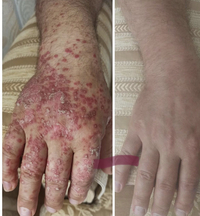The vagina is an organ that connects the cervix (lower part of the uterus) to the external genitalia of the female. The vagina is also called the birth canal because the baby crosses the vagina during birth.
Table of Contents
Vaginal cancer
Many cancers can spread to the vagina from other areas of the body, but vaginal cancer rarely starts in the vagina. The chance of cure and cure increases if vaginal cancer is diagnosed early. While it is difficult to treat when it moves outside the vagina.
Types of vaginal cancer
- Squamous cell carcinoma of the vagina: It is the most common type and originates in squamous cells, (thin flat cells lining the surface of the vagina).
- Vaginal adenocarcinoma: This type of cancer develops in the glandular cells that produce mucus in the vagina.
- Vaginal melanoma: It is a rare type that develops from melanocytes in the vagina.
- Vaginal sarcoma: This type of vaginal cancer originates from the tissues of the vaginal wall such as fat, connective tissue, muscle cells, and others. It is a rare type of vaginal cancer.
Symptoms of Vaginal Cancer
Signs and symptoms of vaginal cancer include:
- Vaginal bleeding after intercourse, between menstrual periods, or after menopause.
- Abnormal vaginal discharge with a foul smell.
- Pain when having intercourse.
- The presence of a lump in the vagina.
- Pain and difficulty during urination.
- Frequent urination per day.
- Constipation.
- Pelvic pain.
- Pain or swelling in the legs.
Causes of vaginal cancer
There are several causes of vaginal cancer, most notably:
- Aging.
- A history of intra-vaginal epithelial tumors or cervical or vulvar cancer.
- Radiation therapy.
- Hysterectomy as a result of tumors.
- HPV infection and genital warts.
- Vaginal secretion, which is one of the treatments used to treat uterine prolapse.
- Cigarette.
Complications of vaginal cancer
Among the most prominent complications of vaginal cancer are the following:
- Cancer has spread to other organs such as the lungs and liver.
- Influence on the sexual relationship.
Diagnosis of vaginal cancer in Turkey
The first step in diagnosis
Initial diagnostic procedures include:
- Pelvic examination: during which the doctor can examine the external genitalia. Then he inserts two fingers into the vagina and presses with the other hand at the same time on the abdomen to feel the uterus and ovaries.
Pap test: It is usually used to screen for cervical cancer, but sometimes vaginal cancer can be detected by a Pap test.
The second step in diagnosis
If previous Pap tests result is abnormal, other tests may be done to diagnose vaginal cancer, such as:
Colposcopy: It is a vaginal examination that allows enlarging the surface of the vagina to see any abnormal cells.
Biopsy: A procedure to obtain a sample of tissue suspected of cancer. Your doctor may take a biopsy of tissue during colposcopy and send this sample to a lab to see it under a microscope.
The third step in diagnosis
After your doctor diagnoses vaginal cancer, he or she will perform imaging tests, such as
- X-ray imaging.
- Computed tomography.
- Magnetic resonance imaging.
Prevention of vaginal cancer
The risk of injury can be reduced by:
- Have pelvic exams and Pap tests on a regular basis.
- Consult your doctor about taking the HPV vaccine to prevent infection, thus reducing the risk of vaginal cancer.
- Stop smoking.
- Waiting after reaching adolescence for sexual intercourse.
- Use condoms during sexual intercourse.
Treatment of Vaginal Cancer in Turkey
Surgery
This is the most common treatment for vaginal cancer, as a laser may be used to remove cancerous tissue. Sometimes the doctor resorts to removing the entire vagina or part of it, and the doctor may resort to hysterectomy to remove the cervix or other organs.
Many women can have a normal sex life after surgery. But having sex can increase the chances of infection and cause bleeding at the surgical site.
Radiation therapy
This treatment uses high-energy X-rays or other forms of radiation to eliminate cancer cells. Radiation is sent into the body and radioactive material can be inserted into the body.
Radiation therapy in the pelvic area can damage the ovaries. This can lead to them stopping estrogen and the appearance of menopausal symptoms, such as hot flashes and vaginal dryness. This treatment can also irritate healthy tissue, and swollen vagina so intercourse may cause some pain.
We have shed light on everything related to vaginal cancer in Turkey. For more information about vaginal cancer treatment in Turkey. You can request a free and instant consultation by contacting the best gynecologist in Istanbul, Prof. Dr. med. Sona Özdemir. You can book an appointment to visit Medicsey Center using our website. With more than 30 years of experience, our medical staff strives to provide the best results at the best acceptable prices.
read more: IVF Tube Baby














